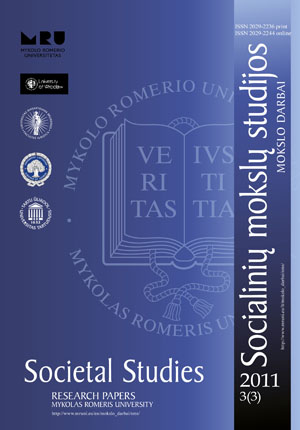Kaimo teritorinės savivaldos seniūnų dalyvavimas mokyklų tinklo pertvarkos politikoje: tikslai, veiklos, sprendimų priėmimas
Participation of Rural Local Government Heads in the Policy of School Network Reorganization: Aims, Activities, Decision Making
Author(s): Daiva Malinauskienė, Audronė Juodaitytė, Rasa Pocevičienė, Erika MasiliauskienėSubject(s): Social Sciences
Published by: Mykolas Romeris University
Keywords: rural local government heads; school network reorganization policy; activities; decision making
Summary/Abstract: The article highlights strategies of rural local government heads’ involvement and participation in school network reorganization policy. Heads’ as participants’ roles (passive, active, indifferent) as well as nature and content of their decisions (administrative, strategic) is examined. On the basis of qualitative research the implementations on the nature of school network reorganization policy as well as on the importance of activity, delegated to local government heads in the processes of school network reorganization are formulated. The content of the “top to down” policy is disclosed; on the basis of its analysis, it is stated that centralized nature of decision making on closing of rural schools disparages not only the roles of local government heads as active participants in school network reorganization policy, but also narrows the functions of representation for local community, which primarily includes such groups as parents and children. The knowledge that has an impact on rural government heads’ competence is highlighted. This knowledge is significant in understanding the interconnection between closing of schools and human resource potential as well as with current situation in Lithuanian education system. On the basis of qualitative research data, the insufficient knowledge for local government heads in the activity of school network reorganization is revealed in such areas as: social informal education, pupils’ delivering. Rural government heads narrowly understand social problems of pupils and tend to identify them with pupils’ transportation service while opportunities of pupils’ participation in informal education (club activity) are not related with the quality of future pupils’ intelligence and developing of their social competence, especially in the area of pupils’ mobility (as horizontal as vertical). On the basis of conducted qualitative research conclusions on diminishing of rural local governments heads’ as direct participants’ , functions are formulated, because they are delegated by a higher level institution (Ministry of Education and Science; local Education Departments) to implement the adopted resolutions. This fact distorts the role of rural community in school network reorganization policy, because the main aim of the school network reorganization preparatory stage is the closure of rural schools because of the small number of students and pupils’ direction to reorganized schools, which are located quite far from places of residence. The situation stresses another significant role of local government heads, i.e. arrangements for appropriate pupils’ transportation. However, even in these processes, heads are not the main decision makers, because transport means (yellow school buses) depend on certain schools.
Journal: Socialinių mokslų studijos
- Issue Year: 3/2011
- Issue No: 3
- Page Range: 817-835
- Page Count: 19
- Language: Lithuanian

